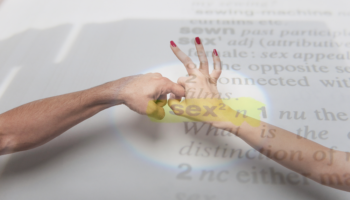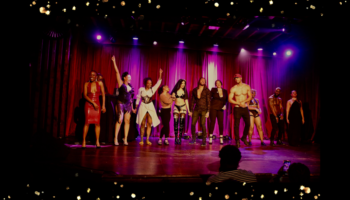Sex education
Why We All Need Sex Ed (Even Adults!)
Published: JUNE 25, 2020 | Updated: SEPTEMBER 28, 2021
No matter our age, experiences, or position in society sex education should be an ongoing journey throughout our lifespan.
Learning is a lifelong journey. We don’t stop learning because we reach a certain age or milestone, or, at least, we shouldn’t. The world is an ever-changing place, we are ever-evolving beings, and new information is discovered every day.
Whether we are in school, going back to school, or past our formal education years, we all have an imperative to continue to learn and grow in all aspects of our life – including in our sexuality and pleasure.
Read: Surprising Lessons Women Learned About Sex Later In Life
Sex Education in Our Youth
We often talk about the importance of sex education for young people, particularly those in their teens and young adult years. We know that in the beginning of our sexual development it is incredibly important to be armed with factual information in order to make informed and empowered decisions.
Young people need to understand everything from how their bodies work, how to respect and set boundaries with others and keep everyone physically and emotionally well. But why do we often leave this conversation to teens and young adults only?
Doesn’t our sexuality and sexual experience change over time? Perhaps, like many other aspects of learning, this is an opportunity to continue to acquire knowledge and modify what we already know to our changing bodies, identities, and life experience.
Read: The Benefits of Knowing Your Body (And Your Vulva)
Why Adults Need Sex Ed Too
Many adults never even received foundational information about sex and sexuality and feel as though they have to act like they completely understand what they are feeling and experiencing simply because they have reached a certain chronological age.
I have met hundreds of people in their 20s, 30s, 40s, or older, who do not know how their reproductive body works, who struggle with past trauma, and who find themselves presenting and identifying in ways that they feel they can no longer call authentic.
They feel shame in admitting that simply pulling information from Google and life experience isn’t enough. Finding resources for sex education for middle-aged and older adults can be daunting, especially when so many sex educational resources and teachers are young themselves.
Despite these obstacles, it is important to continue to pursue personal development around sex as we mature and age. One thing that everyone needs to stay up-to-date on is how physical aging and life experiences, from childbirth to illness, can impact sexual response and comfort.
What worked for us as young people may suddenly seem to taper off or stop working altogether. In the reverse new positions, toys, and fantasies that never did anything for us before may suddenly become our biggest turn on.
How Sex Toys Can Help Us Learn
Sex toys are amazing resources that many us may not have had available to us in our youth. Using toys to explore erogenous zones, such as the G-spot (urethral sponge) or prostate can be something we feel more enjoyable and attuned to as we age. Many of us many not even achieve orgasm until later in our life, once we've had time to properly explore and understand our body.
As we grow, sex toys can help us discover new types of stimulation and new kinds of pleasure! For example, maybe trying an air pulsing clitoral stimulator can help you reach a clitoral orgasm that you never thought possible.
Sex toys can also help us discover new kinds of orgasms. Maybe a dual stimulating rabbit vibrator will help find your G-spot or lead you down the path to a squirting orgasm.
The important thing to remember (and something we don't always realize when we're younger) is that sex isn't just about reaching orgasms. It doesn't matter if you find your G-spot or P-spot, or learn how to have a squirting orgasm or blended orgasm.
By not looking at exploration and sexual exploration as a problem to solve, but as a pleasure to joyfully explore and learn about we can discover new sexual frontiers with each passing decade of life.
Read: The Surprising Things That Happen When You Stop Going for the Orgasm
A Lifelong Education
With an accumulation of experiences and exposure, we additionally gain fresh insight into who we are. Many people may go along with what they were told was alluring or sexually acceptable in their early years, but over time decide to push outside of those societal bounds.
Vanilla sex or monogamous relationship may reveal themselves as no longer a good fit and kink and polyamory become more comfortable. Coming out as a different gender than we were assigned at birth or realizing our sexual attraction is broader or more nuanced than we had previously thought, are all reasons to keep exploring and learning about our sexual selves.
No matter our age, experiences, or position in society sex education should be an ongoing journey throughout our lifespan. The first step is to begin by looking within and being radically honest with ourselves. Without stigma, assumption, or shame what would we truly desire? Where do our interests lead us and what more can we discover by following them, at least mentally, to see what they tell us about ourselves.
I encourage my students to start by journaling about their feelings around their sexual questions. Asking things like, “If I identify as X what does that make me feel?” “What experiences have I desired to explore but held back from, and why?” “What are my fears about new experiences and what is that roots of the anxieties I’m holding onto?”
By unearthing these quandaries, we can come to new understandings about ourselves and find resources to fill in any gaps in information. Sex education is an ongoing process, something that reveals new chapters for us to uncover within ourselves and the world around us.
By letting go of fear and embracing new information we can find benefits in new experiences that continue for the rest of our lives.




